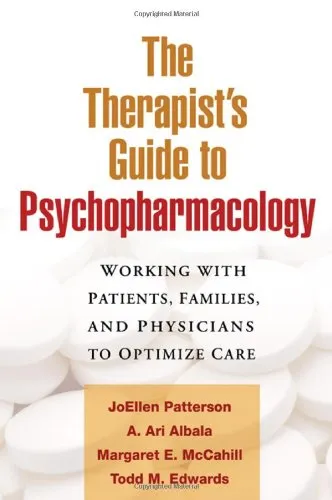The Therapist's Guide to Psychopharmacology: Working with Patients, Families, and Physicians to Optimize Care
4.6
Reviews from our users

You Can Ask your questions from this book's AI after Login
Each download or ask from book AI costs 2 points. To earn more free points, please visit the Points Guide Page and complete some valuable actions.Introduction to "The Therapist's Guide to Psychopharmacology"
Mental health care is an ever-evolving field, requiring professionals to navigate complex challenges while delivering effective and compassionate care. In such a rapidly shifting landscape, incorporating psychopharmacology into therapy can be daunting—yet essential—for addressing the multidimensional needs of clients. "The Therapist’s Guide to Psychopharmacology: Working with Patients, Families, and Physicians to Optimize Care" offers a crucial resource for therapists, counselors, and mental health professionals who wish to deepen their understanding of psychopharmacology while fostering collaborative care relationships. Written by an accomplished team of experts, this book bridges the gap between psychotherapy and pharmacology, empowering therapists to confidently support their clients in comprehensive treatment plans.
Detailed Summary of the Book
This book provides therapists with a foundational understanding of psychopharmacology, without requiring them to have a background in medicine. It explores the intersection of therapy and medication, addressing the essential skills therapists need to collaborate effectively with prescribing physicians and support clients and their families. Topics covered include common psychotropic medications, their mechanisms, potential side effects, and the conditions they target—ranging from mood disorders to anxiety, ADHD, and beyond.
Designed to enhance communication between mental health professionals, clients, and families, the book emphasizes demystifying medications for non-physicians. It includes practical tips, case vignettes, and scripts for navigating sensitive conversations about medications. Additionally, therapists will find evidence-based approaches to assessing client progress when using a combination of therapy and medication. The authors underscore the therapist’s role as a liaison—not a prescriber—while offering realistic strategies for strengthening interdisciplinary collaboration.
Overall, the book serves as a practical guide for non-prescribing mental health professionals who wish to better support their clients’ pharmacological needs while remaining grounded in therapeutic best practices.
Key Takeaways
- Therapists can greatly enhance patient outcomes by understanding the basics of psychopharmacology and effectively collaborating with medical practitioners.
- Common psychotropic medications, such as antidepressants, antipsychotics, and stimulants, play significant roles in treating mental health conditions, but their use must be closely monitored.
- Communication is key—therapists must foster open, nonjudgmental, and stigma-free conversations about medication with clients and their families.
- Interdisciplinary collaboration between therapists, physicians, and psychiatrists minimizes misinformation and ensures the best possible care for clients.
- Ethical considerations, such as respecting boundaries, understanding limitations, and staying within professional roles, are vital when working with medications as a therapist.
Famous Quotes from the Book
"Understanding medications is not about prescribing them—it's about advocating for client care in its most comprehensive form."
"Therapists and prescribers are not competitors—they are partners in guiding clients toward mental wellness."
"A therapist’s knowledge of psychopharmacology acts as a bridge—connecting patients, families, and physicians to achieve optimal care."
Why This Book Matters
In a time when mental health challenges continue to rise globally, therapists are presented with a unique opportunity to impact their clients' well-being through collaborative, integrated care. The importance of "The Therapist's Guide to Psychopharmacology" lies in its ability to empower therapists with the knowledge and confidence needed to navigate the psychopharmacological aspects of treatment. It addresses a significant gap in training for non-prescribing professionals, enabling them to better serve their clients without stepping beyond their scope of practice.
This book is not just a technical resource—it is also a call to trust the power of interdisciplinary cooperation and client-centered care. By equipping therapists with actionable tools and insights, it fosters a holistic approach to mental health treatment that prioritizes collaboration, education, and empathy.
As mental health care continues to evolve, "The Therapist’s Guide to Psychopharmacology" will remain an invaluable resource for current and future therapists committed to optimizing patient outcomes. Whether you are a seasoned professional or just entering the field, this guide offers timeless knowledge to enrich your practice and strengthen your confidence in discussing medications alongside therapeutic interventions.
Free Direct Download
You Can Download this book after Login
Accessing books through legal platforms and public libraries not only supports the rights of authors and publishers but also contributes to the sustainability of reading culture. Before downloading, please take a moment to consider these options.
Find this book on other platforms:
WorldCat helps you find books in libraries worldwide.
See ratings, reviews, and discussions on Goodreads.
Find and buy rare or used books on AbeBooks.
1264
بازدید4.6
امتیاز50
نظر98%
رضایتReviews:
4.6
Based on 0 users review
"کیفیت چاپ عالی بود، خیلی راضیام"


